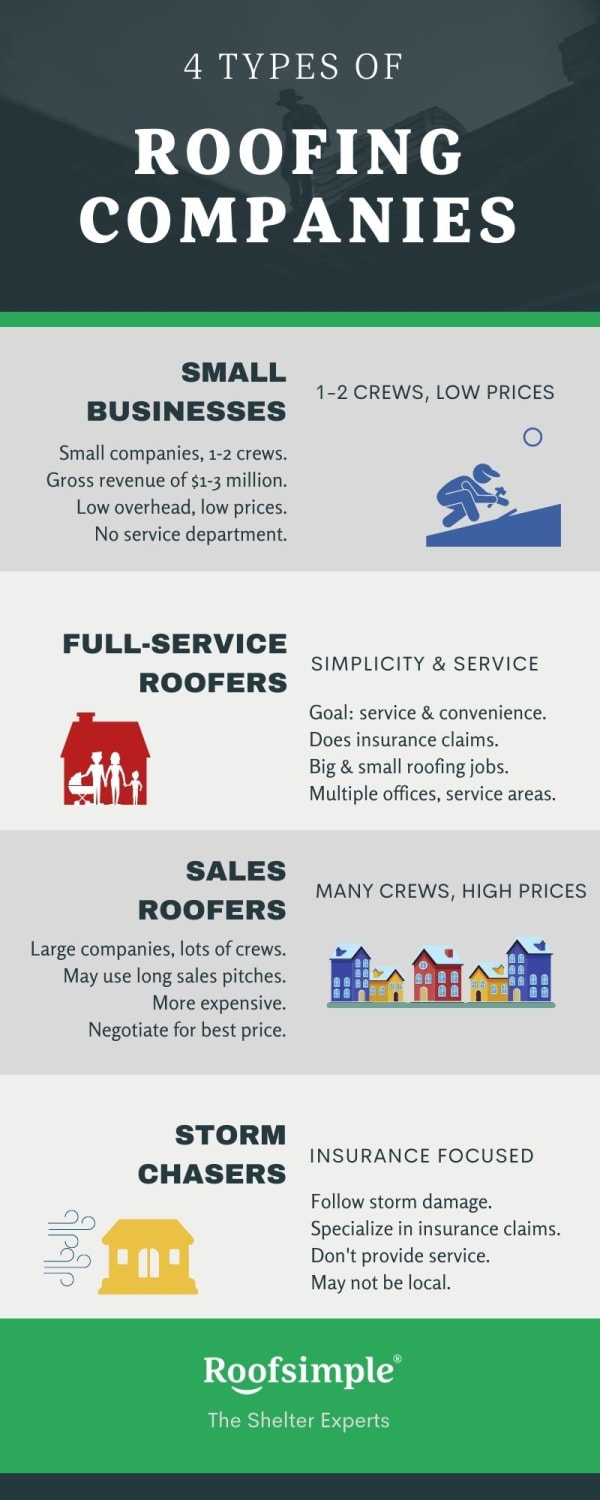4 Types of Roofers: Which Is Right for Your Project? (Infographic)
There are 4 different types of roofers to choose from when you need a new roof. Learn what they are, with the pros and cons of each.

In the roofing industry, there are four types of roofers.
- Small Businesses
- Full-Service Roofers
- Sales Roofers
- Storm Chasers
- Which Type of Roofer Is Right for Your Project?
How do you know which one is right for you?
Each type of roofer has different strengths and weaknesses. So ultimately, it depends on your project and what you feel comfortable with.
So let’s take a moment to review the four types of roofers you’ll be talking to, including their pros and cons.

Small Businesses
Small business roofers are run by one or two people, with maybe a secretary and one or two crews. They don’t usually offer customer support or hand-holding.
With a gross revenue of around $1–3 million a year, these companies don’t have much overhead or profit margins. As a result, they can’t offer a lot of options or negotiate lower prices.
With this type of roofer, you could work directly with the owner of the company, which will help you get a sense for the values of the company and whether they can handle your project.
But with only a few crews, you might find the owner on a roof along with the crew. That means they won’t always be available for customer support calls.
If the owner isn’t working on your project, there won’t likely be a project manager, which means you may need to step in and fill that role. Be prepared to keep an eye on the project to make sure it stays on schedule and gets done to your specifications.
Scheduling may be difficult with the small business roofer, because they don’t always have the bandwidth to do more than one or two roofs at a time.
The Pros:
- They tend to be lower priced and have lower overhead.
- You might get to work directly with the owner of the company.
- They might be more flexible to work with since it’s their company.
The Cons:
- Smaller companies don’t always have a service department. If the owner’s on a roof or on a sales call, he can’t take your call.
- If they only have one crew and they’re backed up, scheduling will be delayed.
- You may need to be very hands-on to get satisfactory results. Be prepared to manage the overall project.
- If you take on the manager role and get impatient and overbearing, you could sour the relationship.
Full-Service Roofers
Full-service roofers focus on just that: service. Their goal is to be both affordable and achievable.
This type of roofer does insurance claims, roof repairs, inspections for real estate companies — whatever you need. Regardless of the type of job, they provide a service layer on top. As a result, they offer one of the best customer experiences.
Their focus is on making it convenient to work with them.
You can schedule an appointment online. They provide a job site support person who is onsite all day for your project, so you have someone who can answer your questions and interface with the crew for you. And they have a crew chief who manages the project and makes sure you’re satisfied with the results.
Be aware, this focus on service doesn’t mean the crew will stop to chat with you. They’re there to finish the job as quickly as possible, so they’re very focused on the job.
The Pros:
- Service roofers are often large enough to have multiple crews available.
- They won’t be the least expensive option, but they can usually be competitive and flexible enough to meet your budget.
- They may have access to different types of materials, which means you can find the price that suits you.
- They can handle large and small jobs, insurance, and non-insurance.
- They may have multiple offices and larger service areas.
- They can offer long-term warranties and high-quality options.
- They focus on customer service and long-term relationships.
The Cons:
- They aren’t necessarily the least expensive option.
- They may not be willing to use low-quality materials just to match a competitor’s price or win the bid.
Sales Roofers
Sales roofers are larger companies who do retail roofing or storm chasing (more on that type of roofer in a minute). Typically, they do one or the other, but not both.
Sales roofers tend to have a large sales force, which means they can schedule your roof replacement quickly. But you’ll probably be required to listen to a formal presentation before you buy. They’ll also likely require that all decision makers be at that meeting.
Sales presentations can be two- to four-hours long — designed to make you feel like you’re getting a lot of value.
While they have a lot of options available, this type of roofer often presents the highest priced options first. Be prepared to negotiate for the materials and pricing you feel most comfortable with.
Also, if you interrupt the presentation to ask difficult questions, the sales rep will sometimes get offended. (If that happens, think twice about moving forward. It’s a definite red flag.)
With retail sales companies, the salesperson is your point person. They’ll help you sort through all the options available to you. Until the project is complete, you can reach out to them with your questions or concerns.
This type of roofer may offer zero-interest financing. While that may seem like a good option, beware. There are hidden costs you may not be aware of. Learn more about zero-interest financing here.
Retail Sales Roofers
Because these are large companies, they’ll get the job done. But they aren’t focused on the customer experience, and you’ll notice that difference from the first time you talk with them.
Retail sales roofers will do normal roof replacements and should have a customer service department.
Be aware, these companies don’t typically do insurance work because it doesn’t give them the higher prices they want to charge. They might offer in-house financing (i.e., zero-percent financing) or expect you to pay for the roof out of pocket.
Storm Chaser Sales Roofers
If a sales roofer is a storm chaser, that’s usually all they do. They’re insurance-focused, and their entire business is taking care of the insurance process for you.
The Pros:
- They’ll ask for a long sales presentation with all decision makers present, which gives you the chance to ask any questions you may have.
- Because it’s a larger company, they typically deliver on their contracts.
- They may have access to a wide range of materials, which can help you find a price you’re comfortable with. The price is often negotiable as a result.
- They usually have multiple crews, which means they may be able to get to your project sooner.
The Cons:
- Sales presentations can be lengthy and overwhelming.
- They are typically more expensive.
- The salesperson often starts with the highest priced option. Expect to negotiate hard for the best price.
- They may resort to high-pressure sales tactics: “This price is only good today…”
Storm Chasers
Storm chasers follow storms. After a tornado, hurricane, or hail storm has caused significant damage, they’ll go through the area, knocking on doors, offering to check for roof damage.
This type of roofer focuses on insurance claims. Their goal is to come into a neighborhood that has a high probability of needing their services. Their offer to help you with the insurance process is usually well-received, making their lives a lot easier.
Storm chasers usually get paid with the funds you get on your insurance claim. But that may not be enough to cover the full cost of a new roof, so be aware, you may also need financing.
The Pros:
- They know how to work with insurance companies and can streamline that process.
- They usually have several crews working in the same area.
The Cons:
- Service might not be available after your roof has been fixed and the crews have left the area.
- They offer lower warranties and may use cheaper materials.
- They may not offer a lot of options.
Which Type of Roofer Is Right for Your Project?
As you can see, each type of roofer has their pros and cons. The right roofing company for your project depends on your needs — there’s no right or wrong choice.
So evaluate your options carefully, and make the choice that you feel most comfortable with.